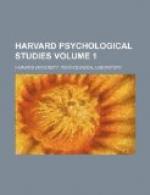The investigation of the problems presented by the psychological phenomena of rhythm has of late years occupied much attention and been pushed in a variety of different directions. Some researches have been concerned with an analysis of rhythm as an immediate subjective experience, involving factors of perception, reaction, memory, feeling, and the like; others have had to do with the specific objective conditions under which this experience arises, and the effect of changes in the relations of these factors; still others have sought to cooerdinate the rhythm experience with more general laws of activity in the organism, as the condition of most effective action, and to affiliate its complex phenomena upon simpler laws of physiological activity and repose; while a fourth group has undertaken a description of that historical process which has resulted in the establishment of artistic rhythm-types, and has sought to formulate the laws of their construction.[1]
[1] Description: (1) Of the psychological factors of the rhythm experience: Angell and Pierce, Ettlinger, Hauptmann, Mentz, Meumann, Stumpf, Wundt, et al. (2) Of its objective conditions and products: Binet et Courtier, Bolton, Ebhardt, Hurst and McKay, Meumann, Schumann, Sievers, et al. (3) Of its physiological accompaniments: Bolton, Bruecke, Dogiel, Hausegger, Mach, Mentz, Ribot, Sherrington, Scripture, Smith, et al. (4) Of its historical evolution: Buecher, Moritz, Scherer, et al.
This differentiation has already made such progress as to constitute the general topic a field within which specialization is called for, instead of an attempt to treat the phenomenon as a whole. It is the purpose of this paper to describe a set of experiments having to do with the second of these problems, the constitution of objective rhythm forms. In the determination of such forms it is, of course, impossible to avoid the employment of terms descriptive of the immediate experience of rhythm as a psychological process, or to overlook the constant connection which exists between the two groups of facts. The rhythm form is not objectively definable as a stable type of stimulation existing in and for itself; the discrimination of true and false relations among its elements depends on the immediate report of the consciousness in which it appears. The artistic form is such only in virtue of its arousing in the observer that peculiar quality of feeling expressed in calling the series of sensory stimuli rhythmically pleasing, or equivalent, or perfect. In no other way than as thus dependent on the appeal which their impression makes to the aesthetic consciousness can we conceive of the development and establishment of fixed forms of combination and sequence among those types of sensory stimulation which arouse in us the pleasurable experience of rhythm. The artistic rhythm form cannot be defined as constituted of periods which are ‘chronometrically proportionate,’ or mathematically simple. It is not such in virtue of any physical relations which may obtain among its constituents, though it may be dependent on such conditions in consequence of the subordination to physical laws of the organic activities of the human individual. The view must be subjectively objective throughout.




